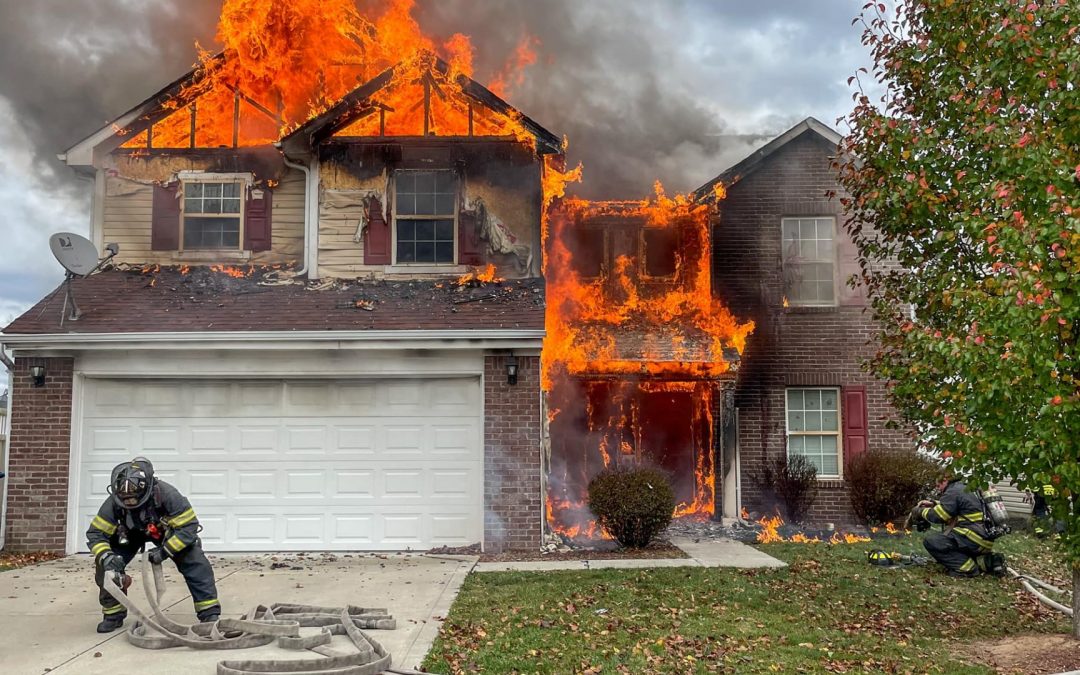A friend of mine shared her story with me that when she was about 5, her neighbor’s house exploded in a fireball due to fireworks they had stored in their garage. She told me she could vividly remember flames were shooting out of every window of their house as she ran to the phone in her kitchen to call 911 while her family ran outside to try to get the neighbors and their pets out of the house. Fortunately, everyone survived, but she told me she remembered the neighbor family standing on the sidewalk in shock while everything they owned burned and this was in the middle of winter. They had left so quickly they didn’t have coats or shoes on so they gathered their spare coats and shoes and gave them to the neighbors to keep them warm while everyone waited for the fire trucks. She shared that she has been leery of fires ever since as it was shocking how quickly the fire spread in their house. In less than 30 seconds a small flame can turn into a large fire so it’s important to be prepared.
Below are some precautions and suggestions for your home.
FIRE SAFETY IN THE HOME: HOW TO BE PREPARED
- Install working smoke and carbon dioxide detectors and check them MONTHLY. In nearly 60% of homes there are non-working smoke detectors or a lack of smoke alarms. Replace smoke detectors every 8-10 years or as specified by the manufacturer. Make sure to have one on each level of your home as well as near your kitchen and all bedrooms. I also put one near our furnace and in our garage to be safe.
- Create an escape plan. Find 2 ways out of your home and set up a family meeting spot away from the home. Practice evacuating with children so they know how to get out and where to go once they’ve left the home. Teach them it’s ok to go out barefoot or without a coat. Also practice with your eyes closed as many times vision will be hindered during a fire. We practice monthly with Oliver and make sure he knows how to open and get out of our front door, back door and his windows, just in case.
- Teach kids to not be afraid of firemen; especially firemen in masks. If your kids happen to be inside the home during a fire they most likely will be afraid so teach them not to hide so they can be rescued. Have them practice calling out for help. Also teach them not to be afraid of the sound of your smoke detector. We practice our fire drills monthly, we make sure to actually set off the alarms so our kids get used to the sound of the alarm. We also practice crawling on the floor in case of smoke and we have them practice from various parts of the house. We’ve also taught them to bang on windows and make a lot of noise in case they trapped and can’t get out. We also practice this in the car in case we’re ever in an accident and I’m knocked unconscious.
- Remember: Stay low, feel the door knob, get out, and call 911 once you are outside and safe.
- Make sure upstairs rooms have functioning windows – grease the locks and make sure windows are not super hard to open.
- Have roll-up or fold-down ladders in upstairs bedrooms in the event that someone is trapped upstairs during a fire. Practice this type of evacuation so kids know how to safely climb down. Ideally have one in every room someone regularly sleeps in.
- Make sure basement windows have at least one or two egress windows that are large enough for someone to get out of the window. If there’s a window well make sure there is a ladder in the window well so someone can climb out in case of fire.
- Have ample fire blankets and fire extinguishers. Store a fire blanket under every bed and keep a fire extinguisher in every bedroom as well as one in the kitchen and garage. Make sure to inspect the fire extinguishers each year. Everyone should know exactly where these items are for a quick response and you should explain to your kids how to use them.
For additional peace of mind, check out devices such as the Nest Protect,* which we love. I love that they are connected to each other and will go off if one senses a fire at another alarm. It’s also nice when you have babysitters or nannies as you’ll be notified immediately on your phone if one of the smoke detectors starts going off. If Nest is not something that interests you, The Roost battery* retrofits into your existing smoke detectors. It effortlessly connects to your WiFi and sends push notifications to your phone or device. It only needs to be replaced every 3-5 years. Click the links to find out more about those life-saving technologies.
WAYS TO AVOID FIRES:
- Don’t leave pans on the stove cooking unattended. Grills need to be at least 10+ feet away from anything that could catch fire such as your home and be sure to NOT throw out hot ashes.
- Never leave candles or warmers unattended. I can’t tell you how many times I go into a house for showings and the seller has left a candle burning. Do not do this.
- Smoke outside and away from oxygen tanks. Keep an ashtray or metal can handy to soak butts before disposing.
- Space heaters are popular in colder climates and seasons such as CO. Only use them 3+ feet away from anything that could catch fire and place them on level ground so they cannot be knocked over. I also don’t recommend keeping them on at night when you are sleeping. A colleague’s friend died when a space heater caused a fire in his home a few years ago. It’s not worth the risk.
- Don’t leave appliances such as crock pots plugged in overnight.
- Educate children on fire safety. Matches and lighters need to be stored away from children’s reach; ideally in a locked cabinet.
- Don’t leave kids unattended around sources of fire. Warn against touching or placing things in fireplaces or on candles in the home.
*Wilks Real Estate is not affiliated with these brands, these are merely suggestions for homeowners to look into for ways to be alerted when there is a fire emergency. Please do your own research when it comes to making sure your home is as safe as possible in case of a fire.

